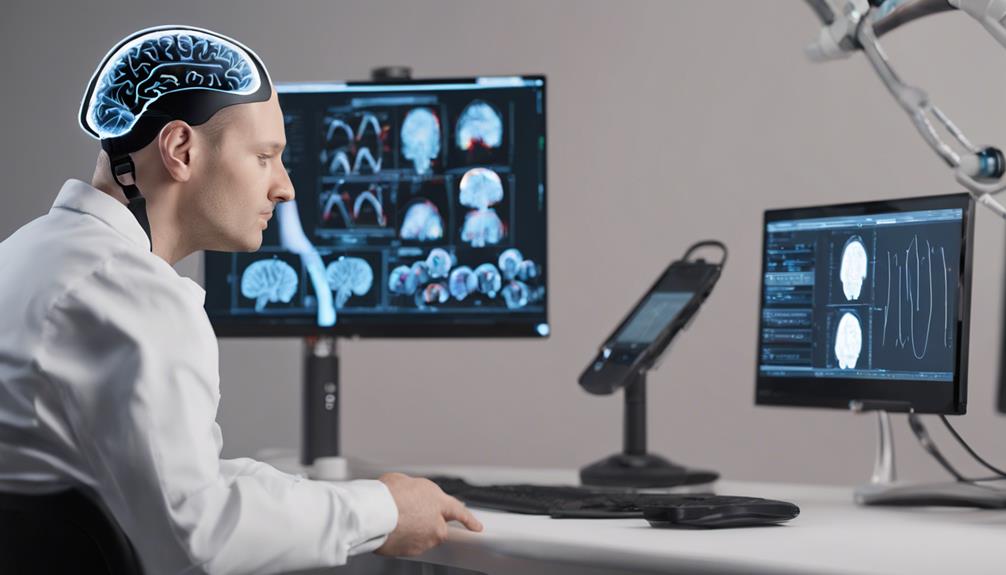Neurofeedback Training: Rewiring the Brain for Optimal Function
Did you know that neurofeedback training has shown promising results in improving attention and reducing symptoms of ADHD in 75% of cases? Imagine being able to enhance your cognitive abilities and mental performance by simply rewiring your brain through targeted exercises. With neurofeedback, you have the ability to optimize your brain function and unleash your full potential. So, why not explore this innovative approach further and discover how it could benefit you in ways you never imagined?
Key Takeaways
- Neurofeedback training enhances cognitive functions through brainwave regulation.
- Real-time feedback allows for modifying brainwave patterns for optimal brain function.
- Improves mental performance by synchronizing brainwave frequencies.
- Targets specific brain functions to rewire for cognitive enhancement.
- Offers non-invasive, drug-free methods for optimizing brain activity.
Understanding Neurofeedback Training
To comprehend neurofeedback training, it's essential to grasp the fundamental principles of how brain activity can be monitored and regulated through specialized techniques. Brain training involves using neurofeedback to enhance cognitive functions by providing real-time feedback on brainwave activity. Through this process, individuals can learn to regulate their brainwaves, leading to cognitive enhancement and improved mental performance.
Neurofeedback training works by monitoring brainwave patterns using electroencephalography (EEG) technology. By analyzing these patterns, specific brainwave frequencies associated with different mental states can be identified. Through neurofeedback sessions, individuals are trained to modify their brainwave activity consciously. For example, increasing beta waves can improve focus and alertness, while enhancing alpha waves can promote relaxation and creativity.
Brainwave Regulation Techniques
Brainwave regulation techniques involve the systematic training of individuals to consciously modify their brainwave activity for cognitive enhancement and mental performance optimization. Through neurofeedback training, individuals learn to regulate their brainwave synchronization patterns, such as increasing beta waves for improved focus or decreasing theta waves for relaxation. This training aims to enhance cognitive functions like attention, memory, and problem-solving skills by teaching individuals to self-regulate their brain activity.
Brainwave synchronization plays an important role in cognitive enhancement as different brainwave frequencies are associated with specific mental states. For instance, beta waves are linked to alertness and concentration, while alpha waves are connected to relaxation and creativity. By training individuals to control their brainwave patterns, neurofeedback can help optimize mental performance in various tasks requiring focus, creativity, or relaxation.
Understanding how brainwave regulation techniques impact cognitive functions is essential for maximizing the benefits of neurofeedback training. By honing the ability to modulate brainwave activity, individuals can improve their cognitive performance and overall mental well-being.
Applications in Mental Health
You'll explore the mental health benefits, therapeutic effectiveness, and clinical applications of neurofeedback training.
This technique has shown promise in aiding various mental health conditions by enhancing self-regulation and overall brain function.
Understanding its clinical applications can provide valuable insights into its potential as a therapeutic tool for optimizing mental well-being.
Mental Health Benefits
Utilizing neurofeedback training has shown promising results in enhancing mental health by regulating brain activity patterns. This innovative approach aids in stress reduction by teaching individuals how to self-regulate their brain function, leading to decreased levels of stress and improved coping mechanisms. Neurofeedback training has been particularly effective in providing anxiety relief by targeting specific brain regions associated with anxiety and teaching individuals to modulate their brain activity in these areas. By learning to control their brainwave patterns through neurofeedback, individuals can experience a reduction in anxiety symptoms and an overall improvement in mental well-being.
Moreover, neurofeedback training offers a non-invasive and drug-free method for addressing mental health concerns, making it a valuable option for individuals seeking alternative treatments. The ability to directly target and modify brain activity through neurofeedback has paved the way for personalized and effective interventions in managing stress and anxiety, ultimately promoting better mental health outcomes.
Therapeutic Effectiveness
In evaluating therapeutic effectiveness in mental health applications, neurofeedback training demonstrates promising results in regulating brain activity patterns to improve overall well-being. Studies focusing on treatment outcomes and long-term effects have shown significant improvements in conditions such as anxiety, depression, ADHD, and PTSD. Efficacy studies continue to provide research updates, indicating the potential of neurofeedback in enhancing mental health interventions.
| Therapeutic Effectiveness in Mental Health Applications | |
|---|---|
| Benefits | |
| – Improved regulation of brain activity patterns | |
| – Reduction in symptoms of anxiety and depression | |
| – Enhanced focus and attention levels |
Neurofeedback training offers a non-invasive approach that targets specific brain functions, leading to observable changes in behavior and cognitive function. Through ongoing research and clinical trials, the field continues to expand, providing new insights into the efficacy and long-term benefits of utilizing neurofeedback as a therapeutic tool for mental health disorders.
Clinical Applications
Clinical applications of neurofeedback training in mental health demonstrate significant advancements in targeting specific brain functions to improve cognitive and behavioral outcomes. Neurofeedback success stories and case studies have shown promising results in treating various mental health conditions such as ADHD, anxiety, depression, and PTSD. By utilizing neurofeedback training protocols and guidelines tailored to individual needs, clinicians can effectively modulate brain activity, leading to improvements in attention, emotional regulation, and overall mental well-being.
Neurofeedback training involves real-time monitoring of brain activity through electroencephalography (EEG) sensors, allowing individuals to learn self-regulation techniques. Through repetitive sessions, individuals can modify their brainwave patterns, promoting healthier neural pathways and enhancing cognitive function. These personalized interventions aim to address specific symptoms and target dysfunctional brain networks associated with various mental health disorders.
The integration of neurofeedback into clinical practice offers a non-invasive and drug-free approach to mental health treatment. As research continues to expand in this field, neurofeedback holds promise as a complementary therapy in promoting optimal brain function and psychological well-being.
Enhancing Cognitive Performance
To optimize cognitive performance, consider implementing memory-boosting techniques and focus improvement strategies. Enhancing memory retention and sharpening focus are essential components in achieving peak cognitive function.
Memory Boosting Techniques
Implementing established memory-boosting techniques can greatly enhance cognitive performance and overall brain function. Recall enhancement is a key aspect of memory improvement. Techniques such as spaced repetition, where you review information at increasing intervals, have been shown to greatly boost retention. When you actively engage with the material multiple times over spaced intervals, your brain forms stronger neural connections, leading to improved recall abilities.
Another effective method for cognitive retention is mnemonic strategies. By associating new information with familiar cues or creating vivid mental images, you can enhance memory encoding and retrieval processes. When you link new knowledge to existing schemas in your brain, you facilitate easier access during recall tasks.
Furthermore, incorporating regular physical exercise into your routine can support memory function. Exercise has been found to promote neuroplasticity, the brain's ability to reorganize itself by forming new neural connections. As you engage in physical activity, you stimulate the production of neurotrophic factors that enhance cognitive performance and aid in memory consolidation.
Focus Improvement Strategies
Enhance your cognitive performance through targeted focus improvement strategies. Utilizing attention training and concentration techniques can greatly enhance your ability to focus and improve cognitive function.
Here are some key strategies to help you optimize your focus:
- Mindfulness Meditation: Engaging in regular mindfulness meditation can help increase your attention span and improve your ability to concentrate on tasks.
- Break Tasks Into Smaller Steps: Breaking down complex tasks into smaller, manageable steps can help prevent feelings of overwhelm and improve focus on each individual component.
- Utilize the Pomodoro Technique: This time management method involves working in short, focused bursts followed by short breaks, helping to maintain high levels of concentration and productivity.
- Eliminate Distractions: Creating a distraction-free environment by turning off notifications, finding a quiet workspace, and minimizing interruptions can greatly enhance your ability to concentrate on the task at hand.
Non-Invasive Neurofeedback Benefits
Non-invasive neurofeedback techniques offer a range of benefits to optimize brain function without the need for invasive procedures. These methods provide effective stress reduction and aid in managing anxiety. By utilizing non-invasive neurofeedback, individuals can experience a reduction in stress levels, leading to improved overall well-being. The ability to regulate brain activity through neurofeedback contributes to a more balanced stress response, enhancing one's capacity to cope with daily challenges.
Moreover, non-invasive neurofeedback is instrumental in managing anxiety. Through targeted training sessions, individuals can learn to modulate their brainwave patterns, resulting in decreased anxiety levels. This process empowers individuals to recognize and control anxious thoughts, fostering a greater sense of calm and emotional stability. By honing in on specific brain functions associated with anxiety, non-invasive neurofeedback offers a valuable tool for enhancing mental health.
Achieving Peak Mental Wellness
To optimize your mental wellness, harnessing neurofeedback training techniques can be a powerful tool for enhancing cognitive function and emotional well-being. By incorporating mindfulness practices and stress management techniques, you can achieve peak mental wellness through neurofeedback training. Here are some key strategies to help you reach peak mental well-being:
- Mindfulness Practices: Engaging in mindfulness exercises can help you increase self-awareness, improve focus, and reduce rumination, leading to a calmer and more balanced mental state.
- Stress Management Techniques: Learning effective stress management techniques such as deep breathing, progressive muscle relaxation, or guided imagery can substantially reduce stress levels and promote mental clarity.
- Consistent Neurofeedback Sessions: Regular neurofeedback sessions can help retrain your brain to function more efficiently, enhancing cognitive abilities and emotional regulation over time.
- Personalized Training Plans: Working with a trained neurofeedback specialist to develop personalized training plans tailored to your specific needs can maximize the effectiveness of the neurofeedback training process.
Conclusion
You have explored the world of neurofeedback training, revealing its power to rewire the brain for peak function. By utilizing brainwave regulation techniques, this personalized and non-invasive method offers a pathway to enhanced cognitive performance and mental wellness.
Through targeted improvements in focus, alertness, relaxation, and creativity, neurofeedback training allows for a transformative journey towards peak mental well-being. Embrace the potential of neurofeedback to unleash the full capabilities of your mind.







